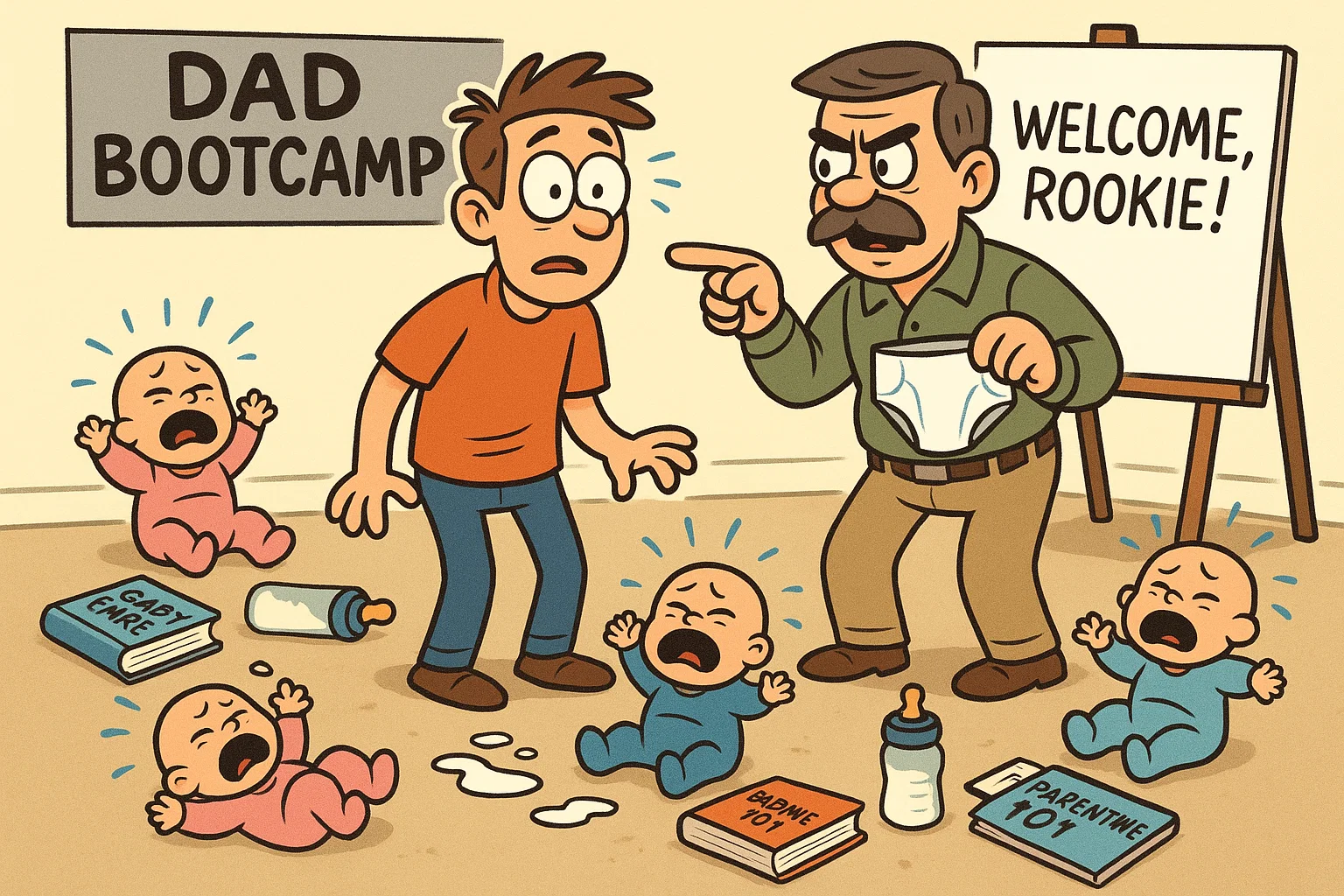Becoming a father is one of the most significant life changes you’ll ever experience. While you’ve likely spent months getting the nursery ready and attending doctor’s appointments, true preparation for fatherhood goes far beyond the physical. It’s a mental, emotional, and practical journey that starts long before the baby arrives. This guide will walk you through every step of the way, helping you prepare for a baby and become a great dad.
Key Mental Shifts Before Fatherhood
Preparing for fatherhood isn’t just about reading books or buying gear; it’s about a deep, internal shift. Your identity, your priorities, and your role in the world are all about to change in profound ways. Embracing this transformation is key to a smooth transition.
Accepting the New Role
You’re no longer just an individual; you’re about to become a caretaker, a protector, and a provider in a completely new sense. This mental transition can be daunting, but it’s also incredibly rewarding. Start thinking about yourself as part of a new team. Your partner and your baby are now your primary focus. This doesn’t mean you lose yourself, but rather you expand your sense of self to include them. This new role as a first-time dad will redefine your purpose and priorities in life.
Building Patience and Emotional Control
Babies cry. They cry a lot. And often, you won’t know why. Learning to manage your own frustration and anxiety now will pay dividends when you’re faced with a screaming baby at 3 a.m. Practice emotional regulation by taking deep breaths, stepping away for a moment when you feel overwhelmed, or simply acknowledging your feelings without judgment. It’s a skill you can build through mindfulness, meditation, or even just by taking a minute to yourself during a stressful day at work.
Dealing With Fear and Doubt
It’s completely normal to feel scared before becoming a dad. You may have questions like, “Will I be a good dad?” or “Am I ready for this?” These feelings of imposter syndrome are universal among dads-to-be. A 2021 study published in the Journal of Perinatal Education found that many expectant fathers experience significant anxiety about their ability to parent, their partner’s health, and their financial readiness. The best way to combat these fears is to talk about them. Share your anxieties with your partner, a trusted friend, or a professional.
Preparing for Lifestyle Changes
Say goodbye to spontaneous weekend getaways and hello to meticulous planning. Your daily life is about to change dramatically. Sleep will be a luxury, your social life will likely shrink for a while, and your time will no longer be entirely your own. While this can feel restrictive, it’s also an opportunity to create new routines and find joy in the little moments. Use your pre-baby time to savor some of your old habits, but also start practicing flexibility and letting go of a rigid schedule.
Preparing the Body and Mind
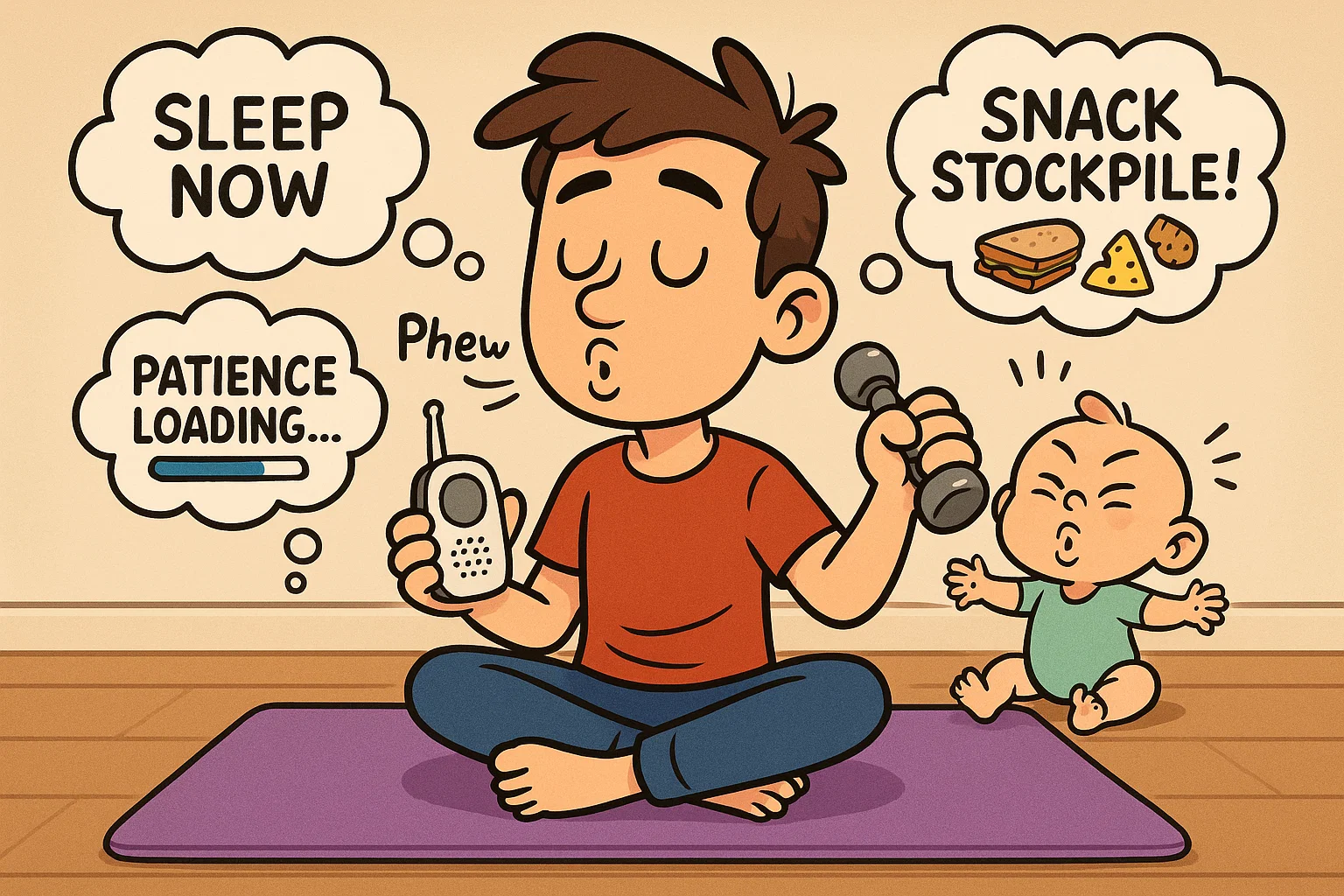
Taking care of your physical and mental well-being is not selfish; it’s an essential part of preparing for fatherhood. A healthy dad is better equipped to handle the demands of a new baby and support their partner effectively.
Establishing Healthy Eating Habits
You’re going to need all the energy you can get. Now is the time to trade out late-night fast food runs for nutritious, easy-to-prepare meals. Focus on a balanced diet of fruits, vegetables, lean proteins, and whole grains. Healthy eating habits will boost your stamina, improve your mood, and help you maintain the energy required for caring for a newborn.
Improving Sleep Schedule
The first few months of parenthood are notorious for lack of sleep. While you can’t “bank” sleep, you can get into a good rhythm now. Practice good sleep hygiene: go to bed and wake up at consistent times, make your bedroom a calm and dark space, and avoid screens before bed. This will make the inevitable sleep deprivation a little easier to manage when the baby comes.
Staying Physically Active
Consistent workouts are not only good for your physical health but also for your mental well-being. Even a 30-minute walk can help reduce stress and improve your mood. Physical activity builds the stamina you’ll need for carrying a heavy car seat, pushing a stroller for miles, or running around with your child in the years to come.
Caring for Mental Health
The months of pregnancy and the postpartum period can be incredibly stressful. You may experience symptoms of paternal postnatal depression (PPND), which a 2010 study in the Journal of the American Medical Association suggests affects up to 10% of new fathers. Don’t hesitate to seek professional help. A therapist, a journal, or stress-management tools can be invaluable resources. Openly talking with your partner about your feelings is also crucial for keeping open lines of communication.
Partner Support and Relationship Goals
Your partnership is the foundation of your new family. The first few months can be a stressful time, and a strong, supportive relationship is the best way to navigate it.
Sharing Pregnancy Responsibilities
You and your partner are in this together. Show your support by attending antenatal classes and doctor’s appointments. Take the lead on household chores, grocery shopping, or cooking meals. By sharing the load, you are demonstrating that you are a team, which will make the transition to parenthood much smoother.
Communication During Emotional Times
Pregnancy is a roller coaster of emotions, and so is the postpartum period. Hormonal changes and anxiety can lead to mood swings. Be a patient listener and avoid the temptation to “fix” every problem. Simply ask, “How can I support you right now?” Keeping open lines of communication is one of the best ways to prepare for a baby.
Keeping Romance Alive
Amidst all the changes, it’s important to prioritize time with your partner. Plan a “babymoon” or schedule regular date nights during the pre-baby time. After the baby arrives, even 15 minutes of uninterrupted conversation can make a huge difference. Maintaining intimacy and connection helps both of you feel seen and valued.
Setting Boundaries With Extended Family
Family and friends will be excited to offer help and advice, but this can sometimes be overwhelming. Discuss with your partner how you will handle visits and advice. It’s okay to set clear, respectful limits on when and how long people can visit, especially in the first few weeks after the baby is born. This protects your time as a new family and prevents unnecessary conflict.
Financial Preparation for Fatherhood
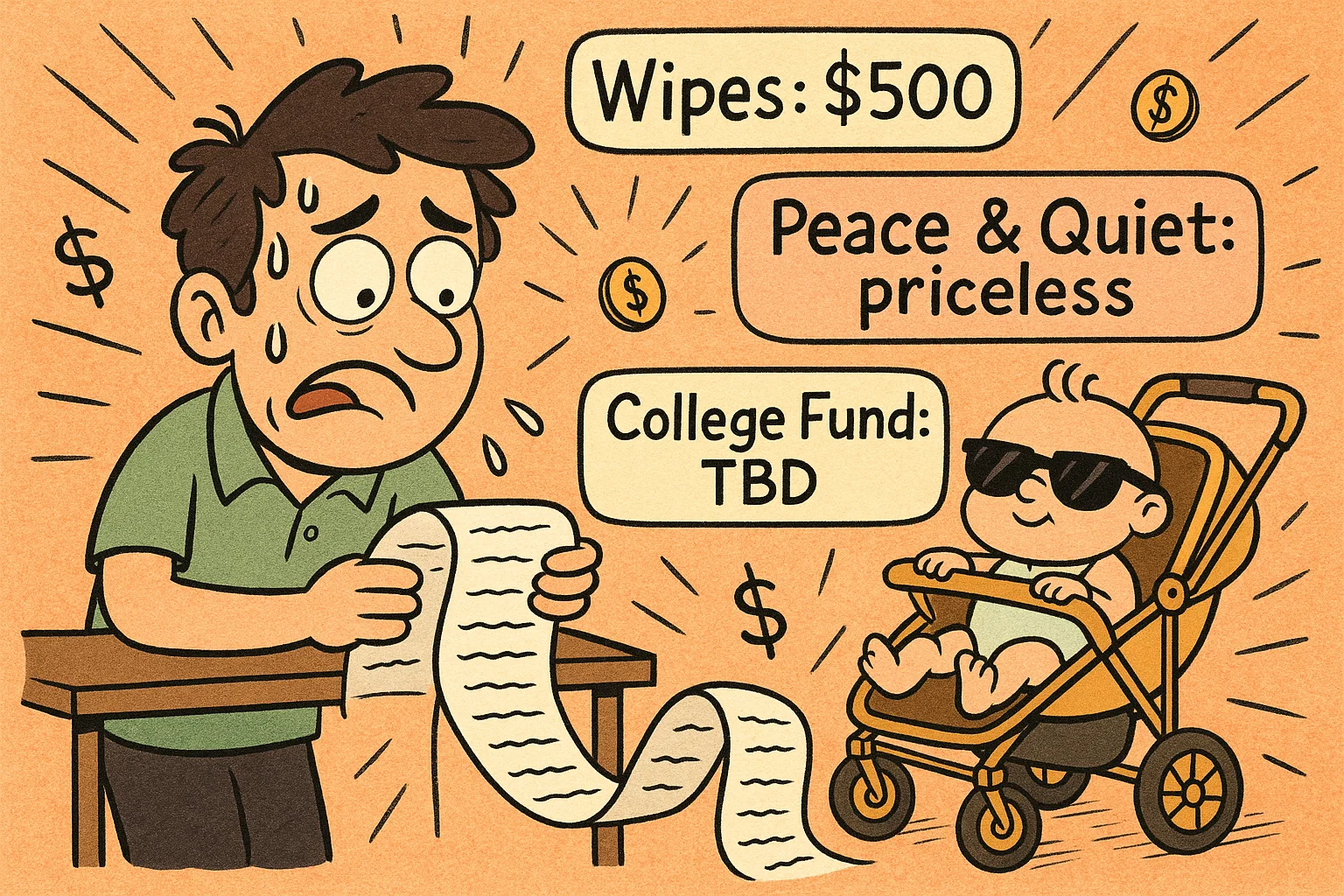
Financial stress is one of the most common challenges new parents face. Taking proactive steps now will give you peace of mind and help you focus on your new family.
Budgeting for Baby Expenses
Babies are expensive. The USDA estimates that raising a child to age 18 can cost over $300,000. Start by creating a budget that includes new recurring expenses like diapers, formula, childcare, and health insurance. Here’s a basic breakdown of common costs:
| Category | Typical Monthly Cost | Notes |
| Diapers & Wipes | $70 – $100 | Depends on brand and usage |
| Formula | $100 – $200 | If not breastfeeding |
| Childcare | Varies widely | Can be a significant expense |
| Health Insurance | Varies | Check your employer’s plan |
| Baby Gear | One-time costs | Stroller, car seat, crib, etc. |
Building an Emergency Fund
Life with a new baby is full of unexpected events, from emergency medical visits to unforeseen repairs. Aim to have at least three to six months’ worth of living expenses saved in a separate account. This financial cushion will be your safety net.
Reviewing Insurance and Benefits
Now is the time to review your life, health, and disability insurance policies. Make sure your baby can be added to your health insurance as soon as they are born. Look into your employer’s policy on parental leave to understand how much paid or unpaid time you will have off.
Starting a Savings Account for Baby
While it may seem early, opening a savings account for your child is a great way to start planning for their future. You might consider a custodial account (UTMA/UGMA) or a 529 plan, which is a tax-advantaged savings plan designed for future education expenses.
Home Setup and Safety
Creating a safe and functional home environment is a tangible way to prepare for a baby. It ensures that when your baby comes home from the hospital, everything is ready and you can focus on bonding.
Choosing Baby Gear Wisely
The baby gear market is massive, and it’s easy to get overwhelmed. Focus on the essentials first: a safe car seat, a crib or bassinet that meets safety standards, a changing table, and a stroller. Do your research to find products that are safe, durable, and right for your family. A great resource is the National Highway Traffic Safety Administration (NHTSA) for car seat guidelines.
Babyproofing Your Space
As your child grows, their world will expand, and so will the risks. Start by babyproofing the nursery and other key areas. This includes securing heavy furniture to the wall, covering electrical outlets, and installing safety latches on cabinets. A professional babyproofing company can also help, but a good checklist and a weekend of work will get you a long way.
Cleaning and Decluttering
A clean, organized home can reduce stress and make caring for a newborn much easier. Declutter your living space and do a deep clean before the baby’s arrival. A calm environment can help you feel more in control during the chaos of the first few weeks.
Preparing the Nursery
Whether you’re setting up a full nursery or just a bedside bassinet, focus on creating a functional and safe space. Make sure all items, from the crib mattress to the changing pad, are firm and securely in place. Consider storage solutions to keep diapers, wipes, and clothes organized and easily accessible.
Building Knowledge and Confidence
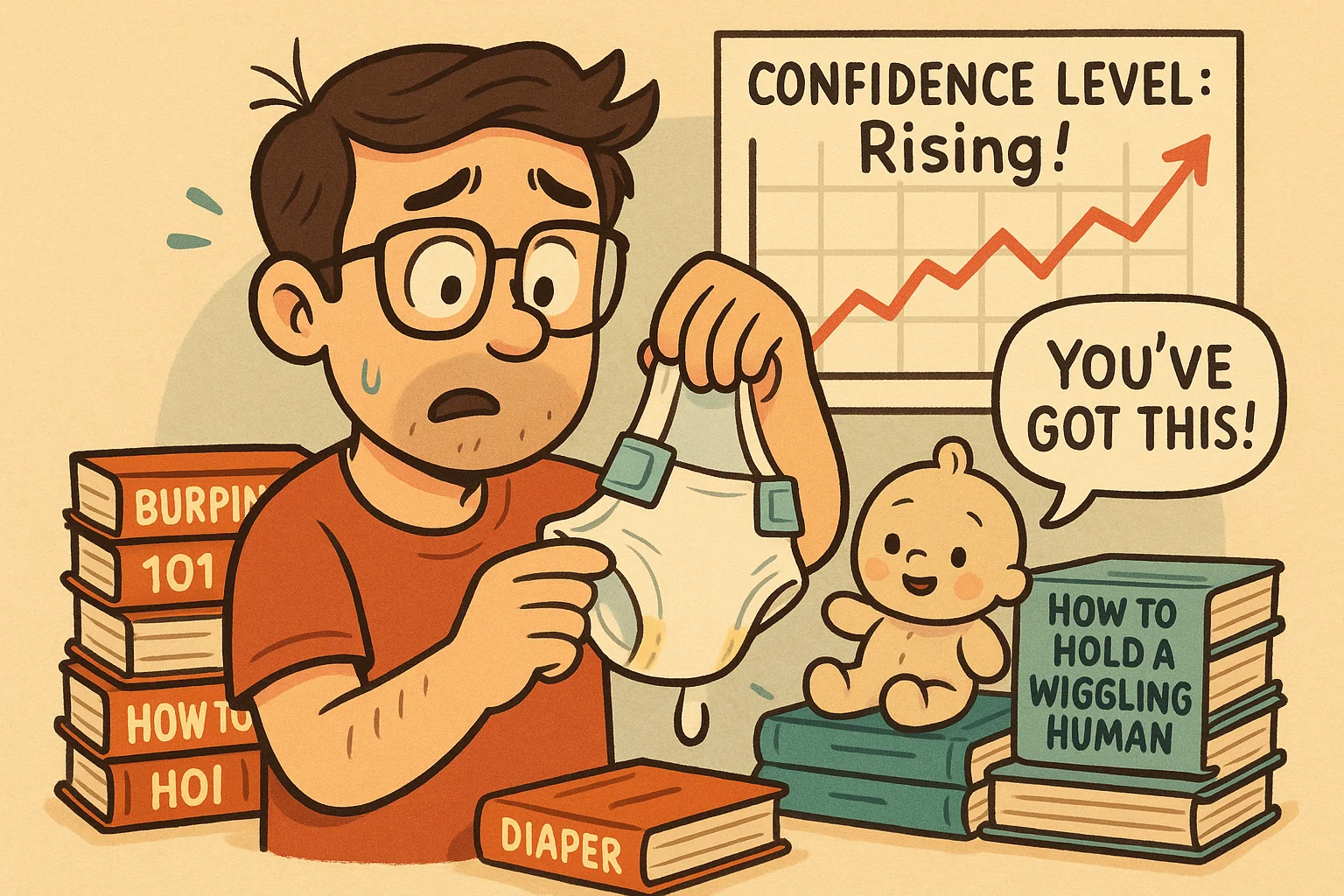
Confidence as a new parent comes from knowledge and practice. Taking the time to learn the basics will make you feel more capable and less anxious.
Taking Parenting Classes
Attending antenatal classes with your partner is a fantastic way to learn together. Many hospitals and community centers offer courses on childbirth, breastfeeding, and newborn care. Consider taking a CPR and first aid class; it’s a skill that could save a life.
Reading Key Fatherhood Books
While there are countless books on parenting, here are a few highly-rated, beginner-friendly options for first-time dads:
- The Expectant Father: The Ultimate Guide for Dads-to-Be by Armin A. Brott and Jennifer Ash
- We’re Pregnant! The First-Time Dad’s Pregnancy Handbook by Adrian Kulp
- Dude, You’re Gonna Be a Dad! by John Pfeiffer
Watching Helpful YouTube Channels or Podcasts
In today’s digital age, there are many resources for dads. Look for channels and podcasts that offer practical advice and humor. Some popular ones include The Dad Experience and Dad Edge Podcast. These can offer a sense of community and reassurance that you’re not alone in this journey.
Learning Basic Baby Care Skills
You’ll feel much more confident if you know how to perform basic tasks. Practice swaddling a doll or stuffed animal, learn the proper way to hold a baby, and get comfortable with changing a diaper. These hands-on skills will make you an invaluable partner in the first few months.
Preparing for the Birth Day
The day your baby is born is a monumental event. Having a plan in place will help you stay calm and be the best support for your partner.
Packing the Hospital Bag
Your partner will have their bag ready, but don’t forget to pack your own! Your hospital bag checklist should include:
- Snacks and drinks
- A phone charger with a long cord
- A change of comfortable clothes
- Toiletries (toothbrush, deodorant, etc.)
- Something to entertain you during the waiting game (book, tablet, etc.)
Discussing Birth Plan and Role
Talk with your partner and their medical center team about the birth plan. What is your role going to be? Are you a supportive presence, or an active helper who cuts the umbilical cord? Understanding your role will help you feel more prepared and less like a bystander.
Installing Car Seat Correctly
This is a critical safety step. The National Highway Traffic Safety Administration (NHTSA) states that three out of four car seats are installed incorrectly. A certified Child Passenger Safety Technician can help you install it properly. Many fire departments or police stations offer free car seat checks. This is a must-do before the baby’s arrival.
Arranging Paternity Leave
Paternity leave is a time for you to bond with your new baby and support your partner. Understand your company’s policies and discuss your plan with your manager. Using this time to its fullest is crucial for both you and your family.
Finding Community and Support
The role of a dad can feel isolating at times. Connecting with other dads is a great way to share experiences, get advice, and build a network of support.
Joining Dad Groups
Connecting with other new dads locally or online can be a huge source of comfort and practical advice. There are countless forums and Facebook groups dedicated to fatherhood, and many communities have in-person new parent groups.
Talking to Experienced Fathers
Ask dads you know—friends, colleagues, or family members—what they wish they knew before becoming a parent. Their real-world experiences and dad tips can be invaluable. Don’t just ask them about the good times; ask about their biggest challenges and what they learned from them.
Staying in Touch With Friends
While your priorities will shift, don’t forget your friends. Maintaining these relationships will help you feel like yourself and provide a much-needed break from the demands of parenthood. Balance is key.
Managing Social Pressure
Society often has outdated expectations for the role of a dad. Be prepared for stereotypes or unhelpful advice. You and your partner are a team, and the best way to raise a child is to do what works for your family, not what others tell you to do.
Becoming the Best Dad You Can Be
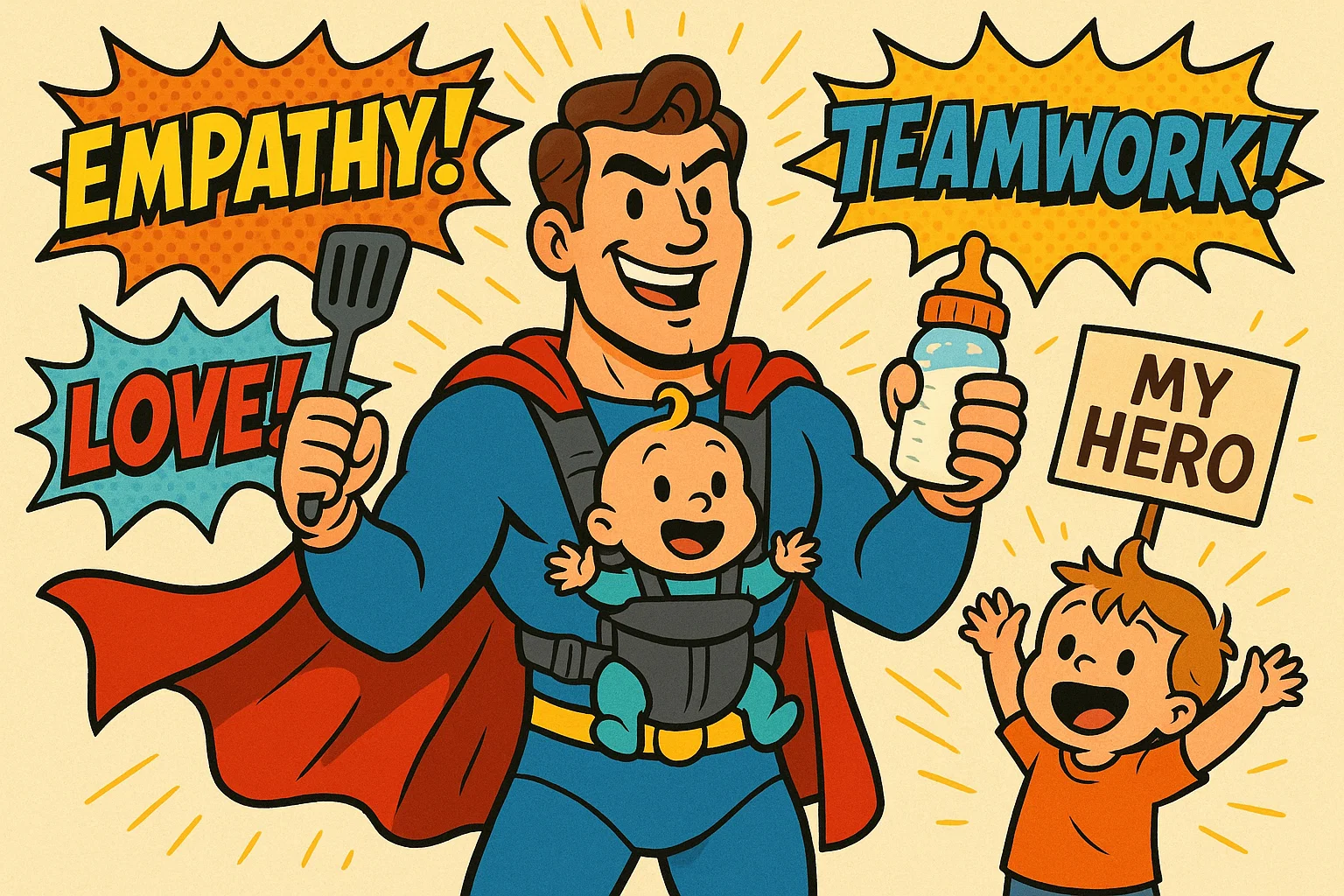
Being a good dad isn’t about being perfect. It’s about being present, loving, and willing to learn. This is a journey, not a destination.
Practicing Presence Over Perfection
Your child will remember your presence, not your perfection. Put your phone away, get on the floor, and play. Being emotionally available and connected is far more important than being a faultless parent.
Embracing Trial and Error
You will make mistakes. Every parent does. The key is to learn from them and move forward. Don’t beat yourself up over a missed feeding time or a forgotten diaper. Each “mess up” is a lesson in how to do it better next time.
Modeling Good Behavior
Your child is always watching you. They learn how to communicate, how to treat others, and how to deal with emotions by observing you. Be intentional about the examples you set, from how you talk to your partner to how you handle frustration.
Reflecting on Your Own Father Figures
Think about your own dad or other important father figures in your life. What did they do well? What would you do differently? Using your upbringing—both the good and the bad—as a lesson can help you intentionally shape your own parenting style.
Tools and Resources for First-Time Dads
Being a new parent is challenging, but you don’t have to go it alone. Utilize these tools and resources to help you along the way.
Best Mobile Apps for New Parents
Mobile apps can be a huge help with a new baby. Apps like Baby Tracker allow you to log feedings, diaper changes, and sleep schedules. The Bump and What to Expect apps also offer week-by-week information throughout the pregnancy and beyond.
Budget Calculators for New Families
Online budget calculators can help you project your new expenses and adjust your budget accordingly. Sites like NerdWallet and Mint offer free tools to help you get a handle on your new family’s finances.
Forums and Communities to Join
Connecting with other dads can be a huge source of support. Check out subreddits like r/daddit or online communities like DaddiLife to connect with other fathers who are on a similar journey.


